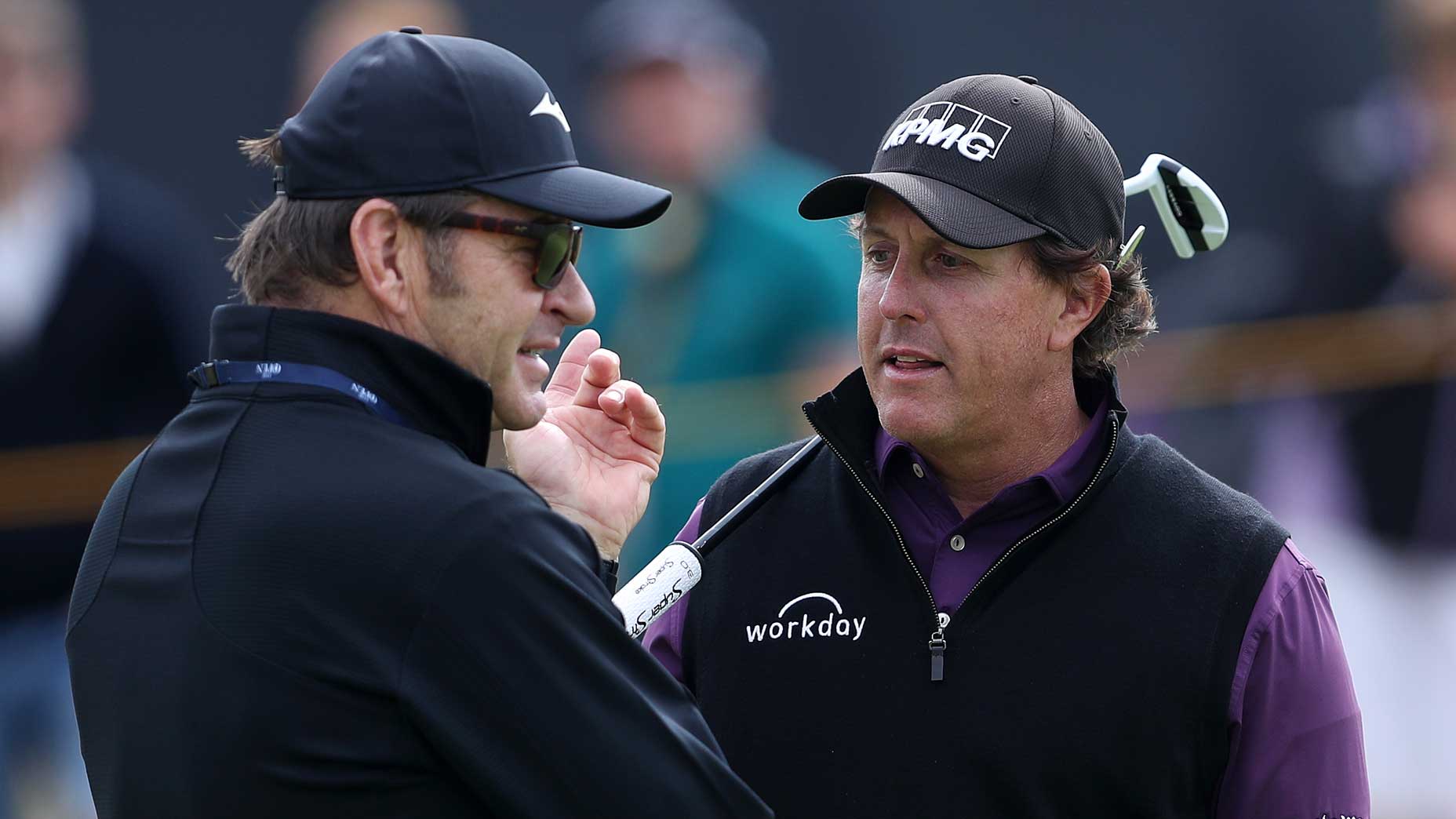Nick Faldo was asked for his thoughts. He answered that question in six words.
“Well, it’s hard and it’s harsh,” he said.
The six-time major champion then offered another six-time major champion one piece of advice.
Outside of the play, the attention at this week’s PGA Championship has been on a golfer not playing. A year ago at this tournament, at the age of 50, Phil Mickelson became the oldest ever to win a major championship; a year later, after a three-sentence statement over Twitter from the PGA of America, he is a withdrawal. By now, you know what happened in between: In February, he made controversial comments over his dealings with the soon-to-begin Saudi-funded LIV Invitational Series, apologized in a statement released over his social media accounts and hasn’t been seen or heard from since.
But he’s been talked about. At Southern Hills, Tiger Woods admitted that he and Mickelson are out of touch. “A lot of it has not to do with, I think, personal issues,” Woods said. “It was our viewpoints of how the Tour should be run and could be run, and what players are playing for and how we are playing for it. I have a completely different stance on [it].” Rory McIlroy said his stance on Mickelson had “softened” and that “people can be forgiven for words.” David Duval, now an analyst with ESPN, questioned why Mickelson has gone silent.
Faldo talked legacy, a popular word over the past few months. About 15 minutes into CBS’ PGA Championship broadcast on Saturday, with the tournament’s Wanamaker Trophy in the background, announcer Jim Nantz asked Faldo, the network’s lead analyst, what he thought after he heard that Mickelson would be a no-show. Notably, these were CBS’ first on-air comments on Mickelson, too.
Toward the end of his answer, Faldo talked to Mickelson directly.
“And I think Phil right now, if he wants to protect his legacy, he’s got to return to the PGA Tour,” he said on the broadcast. “That’s where he created everything, he’s a legend out here, and we know if he needs — wants to go and play for guaranteed cash, we know there’s another option out there.
“But I was thinking about it — he’s done two amazing things. When you come on Tour, all you want to do as a kid is compete — that word, compete — and he won as an amateur, 20, and then at 50, all you want to do is compete and prove you can do it again, and he won at 50. And so that is absolutely — the middle 30 years is pretty darn good too as well; legendary career — but just think of those two things. You’re a golfer, all you want to do is compete.
“You did it as an amateur and he did it at 50 years old, two astonishing things. … You had an incredible career. Like the guys say, to come back out and get on the PGA Tour.”
There are a couple takeaways here. First, the subtle mention of the Saudi series — “wants to go and play for guaranteed cash, we know there’s another option out there.” Officially what we know there is that Mickelson has worked behind the scenes with the LIV Golf Invitational Series, which, yes, is offering a guaranteed paycheck for playing, and that he’s requested a release from the PGA Tour to play in the first event, set for early next month. Registering, however, does not mean Mickelson will definitely play, and the Tour denied all of its members’ requests for the LIV tournament.
Faldo also brought up legacy. Tour commissioner Jay Monahan used that specific word, too, at this year’s Players Championship, when we said: “We are and we always will be focused on legacy, not leverage,” he said when discussing “all of the news, discourse and conjecture lately about the world of professional golf.” Why is all that important? In discussing the Saudi series with Alan Shipnuck, the author of a Mickelson biography, Mickelson had said “the Saudi money has finally given us that leverage.”
Notably, Nantz asked Faldo one other Mickelson question on Saturday:
Where would he rank his PGA victory of a year ago?
“We commented that Sunday afternoon — I said, well, along with Tiger winning his 15th major, this, for me, was one of the greatest achievements in our game,” Faldo said on the broadcast. “To win a major at 50, you got to appreciate the physical effort Phil made was a three-year project, not a three-week one, to get himself to swing the club faster. And then to have the mental strength to be able to take on the youngsters and take it on yourself more importantly — as we know in this game, it’s all about dealing with the negativity.
“But to do that at a major, on a Sunday afternoon, and he outplayed Brooks Koepka, he went on to win and I really believe in our lifetime that will not be topped. Nobody will be older than that.”
